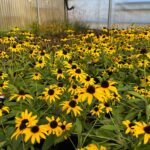In the heart of Virginia’s landscapes, gardening enthusiasts are gearing up for another fruitful season. As spring approaches, soil preparation takes center stage, laying the groundwork for vibrant gardens brimming with life and color. Here are out tips for preparing your soil in Waynesboro County this Spring.
Virginia Gardening Tips
Virginia boasts a rich gardening tradition, with its diverse climate and fertile soil providing an ideal environment for a variety of plants to thrive. The state falls within USDA Hardiness Zones 6 and 7, encompassing a wide range of microclimates from the mountains in the west to the coastal plains in the east. This diversity allows gardeners to grow a wide variety of plants, from cold-hardy vegetables to heat-loving perennials.
Virginia’s spring temperatures typically range from mild to warm, with average highs ranging from the 60s°F to the 70s°F, depending on the region. However, it’s essential to keep an eye on local weather forecasts, as temperatures can vary significantly from year to year. With proper soil preparation and attention to weather patterns, you’ll be well on your way to a successful gardening season.
Materials Needed
Shop for all of your garden supplies at the Waynesboro Garden Center.
- Soil testing kit or services from our garden center.
- Garden fork or tiller for loosening compacted soil.
- Weed removal tools such as a hoe or hand cultivator.
- Organic matter such as compost, aged manure, or leaf mold for soil enrichment.
- Mulch such as shredded leaves, straw, or wood chips for moisture retention and weed suppression.
- Organic fertilizers such as fish emulsion, bone meal, or blood meal for supplementing soil nutrients.
- pH adjusters such as lime or sulfur, if necessary, based on soil test results.
- Protective gear such as gloves and eye protection when working with soil amendments.
Easy Steps to Garden Soil Preparation
Soil preparation is crucial for gardening success because it lays the foundation for healthy plant growth. Properly prepared soil ensures adequate drainage, nutrient availability, and root development, which are essential for plants to thrive. Additionally, soil preparation helps to suppress weeds, prevent soil erosion, and improve overall soil structure, creating an optimal environment for plants to flourish and produce abundant harvests. Whether you are creating a vegetable garden or adding new plants, here are four tips to preparing your soil for spring planting.
Get A Soil Test
Before you start any gardening project, it’s essential to understand the composition of your soil. Conducting a soil test will provide valuable insights into its pH level and nutrient content, helping you make informed decisions about amendments and fertilizers. Contact your local agricultural extension office or garden center to inquire about testing kits or services.
Loosen The Soil
Healthy soil needs adequate aeration to support root growth and nutrient absorption. Use a garden fork or tiller to loosen compacted soil, breaking up clumps and improving drainage. Avoid working the soil when it’s excessively wet, since it can become compacted.
Clear Out Weeds And Debris
Weeds compete with your plants for nutrients and water, so it’s essential to remove them before planting. Take the time to clear out any weeds, rocks, or debris from your garden beds to give your plants the best possible start. Rake out old leaves, dead plants, and grass clippings.
Add Nutrients
To add nutrients to soil, gardeners can incorporate organic matter such as compost, aged manure, or leaf mold into the soil. These organic materials not only provide essential nutrients like nitrogen, phosphorus, and potassium but also improve soil structure and water retention. You can use organic fertilizers such as fish emulsion, bone meal, or blood meal to supplement nutrient levels in the soil. These fertilizers release nutrients slowly over time, providing a steady supply to plants without the risk of over-fertilization. It’s important to follow package instructions and avoid excessive application to prevent nutrient imbalances and potential harm to plants.
Tips to Improve Your Garden Soil
Add Organic Matter: Incorporating organic matter such as compost, aged manure, or leaf mold into your soil will improve its structure and fertility. Spread a layer of organic matter over your garden beds and work it into the soil to enrich it with essential nutrients.
Mulch: Applying a layer of mulch to your garden beds helps conserve moisture, suppress weeds, and regulate soil temperature. Use organic mulches such as shredded leaves, straw, or wood chips, and replenish them as needed throughout the growing season.
Rotate Crops: To prevent nutrient depletion and soilborne diseases, practice crop rotation by planting different types of crops in the same area each year. This technique helps maintain soil fertility and promotes a healthy balance of nutrients.
Install a raised garden bed: This allows you to add soil to the garden that is free of weeds and has the proper nutrients.

See everything we have in store
FAQs
What should I add to my soil before planting?
Before planting, consider adding organic matter such as compost, aged manure, or leaf mold to improve soil structure and fertility.
Is it thin or rich in nutrients?
A soil test can provide insights into your soil’s nutrient content and help you determine if amendments are needed to enrich it.
Is your soil acidic or alkaline?
Conducting a soil test will also reveal the pH level of your soil, indicating whether it’s acidic, neutral, or alkaline. Adjustments can be made using lime to raise pH or sulfur to lower it.
When do I add organic matter?
You can add organic matter to your soil at any time, but incorporating it before planting or during the off-season allows it to decompose and enrich the soil gradually.
Where can I get these materials?
Organic matter such as compost, aged manure, and mulch can often be obtained from local garden centers, farms, or municipal composting facilities. Additionally, many gardeners produce their compost at home using kitchen scraps and yard waste.
Preparing your garden soil is the first step towards a bountiful harvest. By following these simple tips and addressing common questions about soil preparation, you’ll set the stage for a successful gardening season in Virginia. Happy gardening!




